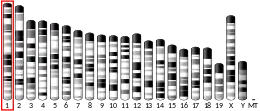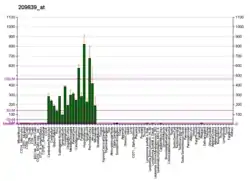Dynamin-3 is a protein that in humans is encoded by the DNM3 gene.[5][6] The protein encoded by this gene is a member of the dynamin family which possess mechanochemical properties involved in actin-membrane processes, predominantly in membrane budding.[7] DNM3 is upregulated in Sézary's syndrome.[8]
References
- 1 2 3 GRCh38: Ensembl release 89: ENSG00000197959 - Ensembl, May 2017
- 1 2 3 GRCm38: Ensembl release 89: ENSMUSG00000040265 - Ensembl, May 2017
- ↑ "Human PubMed Reference:". National Center for Biotechnology Information, U.S. National Library of Medicine.
- ↑ "Mouse PubMed Reference:". National Center for Biotechnology Information, U.S. National Library of Medicine.
- ↑ Nagase T, Ishikawa K, Suyama M, Kikuno R, Hirosawa M, Miyajima N, Tanaka A, Kotani H, Nomura N, Ohara O (May 1999). "Prediction of the coding sequences of unidentified human genes. XII. The complete sequences of 100 new cDNA clones from brain which code for large proteins in vitro". DNA Res. 5 (6): 355–64. doi:10.1093/dnares/5.6.355. PMID 10048485.
- ↑ "Entrez Gene: DNM3 dynamin 3".
- ↑ Orth JD, McNiven MA (February 2003). "Dynamin at the actin-membrane interface". Curr. Opin. Cell Biol. 15 (1): 31–9. doi:10.1016/S0955-0674(02)00010-8. PMID 12517701.
- ↑ Booken N, Gratchev A, Utikal J, Weiss C, Yu X, Qadoumi M, Schmuth M, Sepp N, Nashan D, Rass K, Tüting T, Assaf C, Dippel E, Stadler R, Klemke CD, Goerdt S (February 2008). "Sézary syndrome is a unique cutaneous T-cell lymphoma as identified by an expanded gene signature including diagnostic marker molecules CDO1 and DNM3". Leukemia. 22 (2): 393–9. doi:10.1038/sj.leu.2405044. PMID 18033314.
Further reading
- Nakajima D, Okazaki N, Yamakawa H, et al. (2003). "Construction of expression-ready cDNA clones for KIAA genes: manual curation of 330 KIAA cDNA clones". DNA Res. 9 (3): 99–106. doi:10.1093/dnares/9.3.99. PMID 12168954.
- Sever S (2003). "Dynamin and endocytosis". Curr. Opin. Cell Biol. 14 (4): 463–7. doi:10.1016/S0955-0674(02)00347-2. PMID 12383797.
- Wiejak J, Wyroba E (2003). "Dynamin: characteristics, mechanism of action and function". Cell. Mol. Biol. Lett. 7 (4): 1073–80. PMID 12511974.
- Orth JD, McNiven MA (2003). "Dynamin at the actin-membrane interface". Curr. Opin. Cell Biol. 15 (1): 31–9. doi:10.1016/S0955-0674(02)00010-8. PMID 12517701.
- Tu JC, Xiao B, Yuan JP, et al. (1998). "Homer binds a novel proline-rich motif and links group 1 metabotropic glutamate receptors with IP3 receptors". Neuron. 21 (4): 717–26. doi:10.1016/S0896-6273(00)80589-9. PMID 9808459. S2CID 2851554.
- Hartley JL, Temple GF, Brasch MA (2001). "DNA cloning using in vitro site-specific recombination". Genome Res. 10 (11): 1788–95. doi:10.1101/gr.143000. PMC 310948. PMID 11076863.
- Wiemann S, Weil B, Wellenreuther R, et al. (2001). "Toward a catalog of human genes and proteins: sequencing and analysis of 500 novel complete protein coding human cDNAs". Genome Res. 11 (3): 422–35. doi:10.1101/gr.GR1547R. PMC 311072. PMID 11230166.
- Strausberg RL, Feingold EA, Grouse LH, et al. (2003). "Generation and initial analysis of more than 15,000 full-length human and mouse cDNA sequences". Proc. Natl. Acad. Sci. U.S.A. 99 (26): 16899–903. Bibcode:2002PNAS...9916899M. doi:10.1073/pnas.242603899. PMC 139241. PMID 12477932.
- Ota T, Suzuki Y, Nishikawa T, et al. (2004). "Complete sequencing and characterization of 21,243 full-length human cDNAs". Nat. Genet. 36 (1): 40–5. doi:10.1038/ng1285. PMID 14702039.
- Navarro-Lérida I, Martínez Moreno M, Roncal F, et al. (2004). "Proteomic identification of brain proteins that interact with dynein light chain LC8". Proteomics. 4 (2): 339–46. doi:10.1002/pmic.200300528. PMID 14760703. S2CID 8868600.
- Larsen MR, Graham ME, Robinson PJ, Roepstorff P (2004). "Improved detection of hydrophilic phosphopeptides using graphite powder microcolumns and mass spectrometry: evidence for in vivo doubly phosphorylated dynamin I and dynamin III". Mol. Cell. Proteomics. 3 (5): 456–65. doi:10.1074/mcp.M300105-MCP200. PMID 14762214.
- Kamioka Y, Fukuhara S, Sawa H, et al. (2004). "A novel dynamin-associating molecule, formin-binding protein 17, induces tubular membrane invaginations and participates in endocytosis". J. Biol. Chem. 279 (38): 40091–9. doi:10.1074/jbc.M404899200. PMID 15252009.
- Wiemann S, Arlt D, Huber W, et al. (2004). "From ORFeome to biology: a functional genomics pipeline". Genome Res. 14 (10B): 2136–44. doi:10.1101/gr.2576704. PMC 528930. PMID 15489336.
- Mehrle A, Rosenfelder H, Schupp I, et al. (2006). "The LIFEdb database in 2006". Nucleic Acids Res. 34 (Database issue): D415–8. doi:10.1093/nar/gkj139. PMC 1347501. PMID 16381901.
- Gregory SG, Barlow KF, McLay KE, et al. (2006). "The DNA sequence and biological annotation of human chromosome 1". Nature. 441 (7091): 315–21. Bibcode:2006Natur.441..315G. doi:10.1038/nature04727. PMID 16710414.
External links
- Overview of all the structural information available in the PDB for UniProt: Q9UQ16 (Dynamin-3) at the PDBe-KB.
This article is issued from Wikipedia. The text is licensed under Creative Commons - Attribution - Sharealike. Additional terms may apply for the media files.




